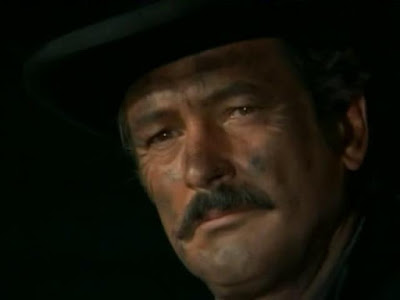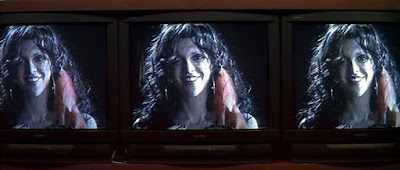
A unfairly overlooked work from director George Seaton, Showdown (1973) is an elegiac and moving Western starring two of American film's greatest icons, Rock Hudson and Dean Martin. Opening and closing quite quickly in 1973, Showdown would turn out to be the last feature directed by the talented Seaton, an Academy Award winning filmmaker whose career stretched across four decades.

Billy Massey and Chuck Jarvis have been best friends for as long as they can remember. They played together as children and it seemed like nothing in the world could ever come between them. A splinter occurred when Chuck married Kate, a woman Billy had always been in love with. As they grew further and further apart with age, Chuck became a respected lawman while Billy turned to a life of robbing banks. After being apart for years, Billy and Chuck’s lives intersect again with tragic results.

George Seaton was born in South Bend, Indiana in the spring of 1911. His initial interest in film lay in acting but Seaton discovered fairly early on that his real talent was with the pen. After years of writing films for 20th Century Fox (including A Day at the Races and A Song for Bernadette) Seaton turned his attentions to filmmaking and he made his debut as a director with Diamond Horseshoe (1945). A talented, if undervalued director, Seaton is probably most famous for the original version of Miracle on 34th Street. Other credits include the searing Clifford Odets adaptation, The Country Girl, the charming Teacher’s Pet and the best picture winning Airport. A two time Oscar winner, Seaton would sadly die of cancer just a few years after finishing Showdown.


Showdown didn’t just mark the end of the road for George Seaton, as it would also feature one of the last major appearances by Dean Martin, who was said to be unhappy during the shoot due to the death of his favorite horse. As if that wasn’t enough, Showdown also also marked an end to the great Rock Hudson's prolific run of films that had started in the fifties and he would just work sporadically after 1973. Showdown stands a real symbolic end to a particular period in American filmmaking and at times it does feel like a nostalgic tip of the hat to the traditional Westerns that were all but dead by 1973. After all this was the period that saw directors like Sam Peckinpah and Monte Hellman totally transform the American Western and the fairly subdued Showdown must have seemed quite out of step to the few folks who saw it upon its initial release. Pity, as Seaton’s film is actually much closer in spirit to a film like Peckinpah’s Pat Garrett and Billy the Kid more than most would have recognized at the time.


With it lovely, and at times, haunting score by David Shire, Showdown is a very effective film throughout it's fairly short running time of 99 minutes. There is something positively epic in this little film about two friends who chose the most different of lives but never stopped caring for each other or forgot where they came from.




The acting is fine throughout with Martin and Hudson surrounded by many top tier character actors including Donald Moffat and Ed Begley, Jr. in a smaller role. Susan Clark does a good job as Chuck's wife Kate, but I always think of Tuesday Weld when I watch the film and can only imagine the multi-layered performance she would have given in the part. Hudson is at the top of his game here, middle aged and exhausted looking but still beautiful. He does a brilliant job at playing a man who has a job to do that he knows will ultimately ask him to make the hardest decision of his life. Martin is excellent as well and it is a performance that improves as the film goes along. At first it appears Dean will be giving one of his patented comic and winking performances but he does some really remarkable heavy dramatic work here as a man who knows what his destiny holds and that there isn't any escape from it.


Shot by prolific cinematographer, Ernest Laszlo, Showdown is gorgeous to look at and his photography is particularly good, although the video and TV versions in circulation ruin the film’s striking 2.35 visual design.




Showdown isn't perfect, I don't think that anyone working on it realized that they had what was close to being a really great film on their hands. It could do with being about thirty minutes longer as more characterization is needed, especially with Kate and Chuck. It feels edited a bit tight also, although the cutting by Diamonds are Forever editor John W. Holmes is mostly well done throughout. Showdown feels like a film that the studio expected to fail but that somewhere along the way Seaton and crew realized they might have a winner on their hands. I think had that thought been there at the beginning, Showdown would have turned out to be a small masterpiece. As it is a very good film with more great moments than anyone might expect.





Showdown does indeed reach greatness in its final few minutes where we see both men reaching their individual destinies. The ending of the film is particularly devastating and the look on Rock Hudson's face as the film closes is powerful, powerful stuff. Showdown shows off Rock Hudson as a master giving one of his last truly great performances.





Showdown would open and close quickly with very little critical or popular attention given to it. For most in the Summer of 1973, it was a product of a time that had slipped away. Ironically it was about two men who themselves were living in a world that had passed them by. Showdown would appear briefly on VHS in the mid nineties but has never been released on DVD. It is currently missing in action and is rarely mentioned in film circles, although it does pop up occasionally on Encore’s Western Channel.






Late in his life, Dean Martin was said to get great pleasure from watching old westerns on TV. I often think about the lovely man, sitting in his chair smoking, with perhaps a drink, and watching the flickering memories of his youth. I sometimes wonder if he ever happened to stumble across Showdown during one of those Western marathons he so enjoyed. Would he have flipped quickly by or would he have stopped, if only for a brief moment, and smiled at a film that is a lot better than anybody has ever given it credit for? There is no telling as we lost Dean, as well as Rock, years ago and I suppose in a way it is fitting, even if it is unjust, that Showdown has in its own way all but been lost to time also.
***This is a massively revised piece that I first posted several years ago here...the screenshots are new, as is much of my text. I just can't seem to shake this film...


















